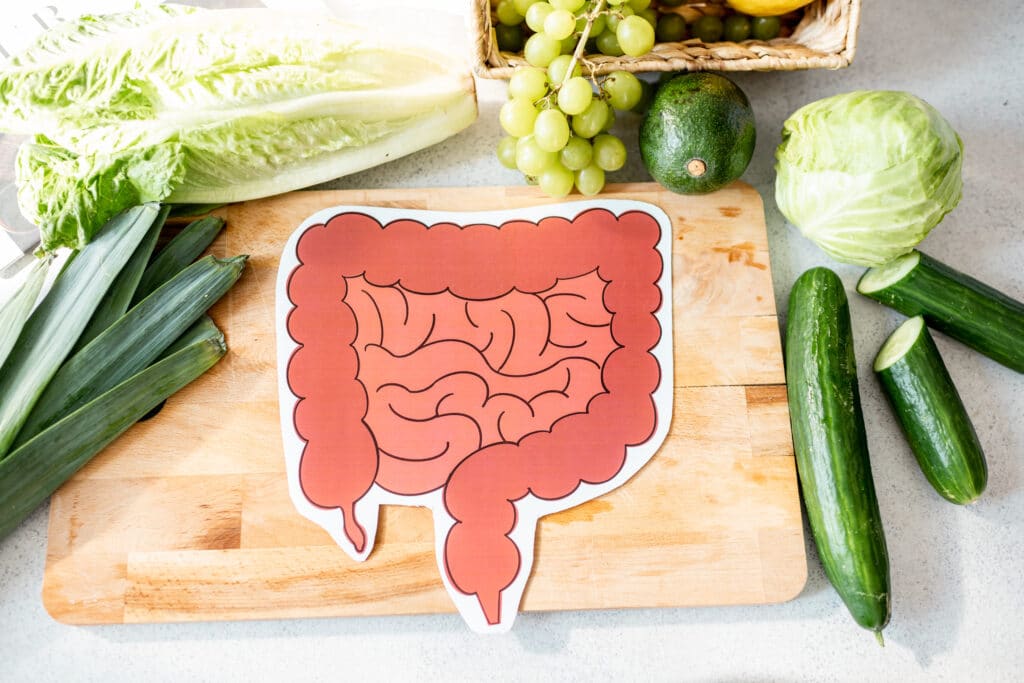Become a Gut Health Expert
Gain the in-depth knowledge necessary to tackle one of today’s most pressing health concerns: digestive wellness. Whether you’re a medical professional, wellness specialist, or someone passionate about fully understanding gut health, this certification will transform you into an expert on this very important topic. The program will equip you with science-backed strategies to understand and restore gut health through nutrition. As a gut health specialist, you’ll have knowledge and tools to fully understand the gut and restore it through nutrition. Equipped with the latest research, practical tools, and interactive activities, you’ll be ready to guide clients toward better health and become a trusted expert in gut health nutrition.

What You’ll Learn in the Gut Health Nutrition Certificate
- The role of the gut in overall wellness, from the gut microbiome’s connection with the immune system to its communication with the brain
- What can disrupt the gut, from sleep, stress, and lifestyle factors to conditions and hormone imbalances
- The latest nutritional strategies to support a healthy gut microbiome, heal the gut, and relieve symptoms
This Gut Health Course is for You If…
- You are a nutrition or wellness professional that wants to specialize in a growing niche.
- You work with clients with digestive issues or autoimmune conditions, including IBS, SIBO, Celiac disease, or Crohn’s.
- You want to holistically address your or a loved one’s gut issues.
- You want to optimize your physical, mental, and emotional health.

What Can I Expect From the Program?

Up-To-Date Curriculum
Features the latest research on nutrition, holistic health, and health behavior change

Fits Your Unique Learning Style
Includes a variety of learning methodologies, from videos to case studies and interactive activities

Handouts & Real-Life Tools
Download, share, and reference dozens of helpful nutrition and lifestyle resources

Affordable Financial Investment
Competitive pricing and interest-free monthly payment plans with no credit checks

Flexible Course of Study
Complete the certification online, using any device you wish
Enrollment Includes Diverse Course Materials
Learners will receive 8 comprehensive online modules that cover everything from gut health science to nutrition strategies. The course also includes 23 downloadable handouts, perfect for future reference and client use. Enjoy a range of multimedia resources, including videos, case studies, and interactive activities. These materials, paired with up-to-date scientific articles and practical tools, ensure you’re equipped with everything needed to support clients and enhance your gut health nutrition expertise.

- 8 online modules with the knowledge necessary to support clients in optimizing their digestive wellness through nutrition and lifestyle
- 23 handouts you can download and print for future use
- Multimedia learning materials to suit your learning style
- 5 engaging case studies and 3 activities to put your newly acquired knowledge into practice
- Up-to-date scientific articles about gut health nutrition
- Tools you can use with your clients to better understand their gut health status
- A toolbox of dietary strategies for addressing specific gut health issues
- A toolbox of lifestyle strategies for supporting gut health in the long term
- Information about research-backed herbs, botanicals, supplements, and probiotics that bring the body back into balance
A Look Inside the Curriculum
Module 1: Introduction to Gut Health Nutrition Answer
- What is Gut Health?
- Why is Gut Health Important?
- An Introduction to a Functional Approach to Gut Health
- The Impact of Genetics and Health Behaviors on Gut Health
- How Does Diet Impact Gut Health?
Module 2: Gastrointestinal Anatomy & Physiology Answer
- The Digestive System
- Brain to Stomach
- Small and Large Intestines
- Accessory Organs
Module 3: The Human Gut Microbiome Answer
- Symbiosis
- Prebiotics and Probiotics from Food and Supplements
- Dysbiosis
Module 4: Inflammation, Stress, & The Gut-Brain Connection Answer
- The Enteric Nervous System
- Immunity and Inflammation
- Stress
Module 5: The Impact of Nutrition on Gut Health Answer
- The Impact of Key Nutrients on the Gut
- The DIGIN Model and the 5 Rs
- Eating Principles and Healing Dietary Protocols
- Therapeutic Elimination Diets
- Restorative Foods for Healing
Module 6: Nutritional Healing Options for Digestive Health Imbalances Answer
Nutritional Strategies for Faulty Digestion with Symptoms in:
- The Mouth
- The Esophagus and Stomach
- The Liver
- The Pancreas
- The Gallbladder
- The Small Intestine
- The Colon
Module 7: Lifestyle Strategies & Approaches for Optimal Gut Health Answer
- Wellness as a Lifestyle
- Eating Principles for Health and Wellness
- Balancing Life Stress
- Cleansing and Detoxification
Module 8: Special Topics in Gut Health Answer
- Food Allergies, Intolerances, and Sensitivities
- Psychobiotics and Mental Health
- Athletes and Sports Nutrition
- Anti-Nutrients
- Social and Environmental Factors
- The Gut Health of Children
What Other Students Are Saying

“I’ve really enjoyed taking the AFPA Gut Health Nutrition Specialist course. The content was well-delivered and easy to understand. I love that you can study at your own pace and that all the material is available for download to refer to and use in my coaching practice. The course covers a wide array of content and I found much of it to be fascinating!”
— Susan W., Gut Health Nutrition Specialist
FAQ
How long does it take to complete this course? Answer
This program must be completed in six months. While it is designed to provide you with ample time to progress , you can request a six-month extension for a fee of $75.
How soon can I start this course? Answer
We have open enrollment, so you may start whenever you are ready. Shortly after completing your purchase, we will grant you access to the learning portal where you can begin your course.
Are there payment plans available? Answer
AFPA offers flexible, interest-free payment plans without credit checks or added fees.
What are the requirements to enroll in this course? Answer
You must be at least eighteen years old and have a solid understanding of the English language to enroll in this program. We also recommend (but do not require) that you:
- Hold at least one current certificate in a health, wellness, nutrition, or fitness discipline (OR) have an undergraduate degree in a health or science discipline
- Have knowledge of health and wellness coaching strategies and practices
How do quizzes and exams work? Answer
All quizzes, exams, and assignments are online, open book, and can be completed when you’re ready.
You must score at least 80% on all quizzes and the final exam to pass and receive your credential and a certificate of completion. You may take a quiz as many times as you need to pass. If you don’t pass the final exam, you can request a retest for a fee of $75.
Do I need to complete continuing education to maintain my certificate? Answer
No, the Gut Health Nutrition Specialist Course is a Certificate of Specialty and does not require you to complete continuing education credits.
Can I earn continuing education credits for completing this certificate of specialty? Answer
Yes! If you’re already AFPA certified, additional certifications count for 16 CECs towards renewal.
Why is gut health important? Answer
The gut is comprised of all body parts and organs involved with taking in and putting out food. This includes the mouth, esophagus, stomach, small intestine, pancreas, liver, gallbladder, colon, and rectum.
Gut health is a core factor in overall wellness. A healthy gut microbiome supports:
- Digestion: A well-functioning gut aids in the digestion and absorption of nutrients, ensuring the body receives essential vitamins, minerals, and energy from food.
- Immune System: The gut is home to a sizable portion of the immune system. A balanced gut microbiome helps defend against infections and promotes immune tolerance.
- Mental Health: The gut-brain axis facilitates communication between the gut and brain, influencing mood, stress levels, and mental well-being.
- Metabolism: The gut microbiome can impact metabolic processes, including how the body stores and uses energy.
- Protection Against Pathogens: Beneficial gut bacteria act as a barrier against harmful pathogens, preventing them from establishing themselves in the gut.
- Detoxification: The gut plays a role in eliminating waste and toxins from the body.
How does diet impact gut health? Answer
The foods we eat provide nutrients not only for us, but also for the trillions of microorganisms residing in our gut.
Consuming a diverse range of foods supports the growth of diverse beneficial gut bacteria. For instance, high-fiber foods, prebiotics, and probiotics promote the growth of beneficial bacteria and nourish the gut microbiome. Staying adequately hydrated and identifying and avoiding food sensitivities can also be beneficial for gut health.
What Is the gut brain connection & how does it impact health? Answer
The gut-brain connection, also known as the gut-brain axis, refers to the bidirectional communication system between the gastrointestinal tract (the gut) and the central nervous system (the brain). This intricate communication pathway plays a significant role in mental well-being and overall physiological balance:
- The gut produces and releases neurotransmitters, like serotonin and dopamine, which facilitate mood regulation.
- Stress and emotional states influence gut function and microbiome composition, while chronic stress can cause imbalances in the gut microbiome and contribute to gastrointestinal disorders.
- An imbalanced gut microbiome can trigger chronic inflammation, which has been linked to mental health disorders like depression and anxiety.
- Emerging research suggests that the gut-brain axis may play a role in conditions like Parkinson’s disease and Alzheimer’s disease.
Are there any restrictions in my state regarding what I can do as a Gut Health Nutrition Specialist? Answer
The laws around health and wellness practitioners vary widely across states.
We encourage you to check your state’s laws before starting your certification.
Can I speak with an Enrollment Specialist before signing up? Answer
Yes, AFPA offers support before, during, and after your certification. To speak with an Enrollment Specialist, email us at info@afpafitness.com or call 800.494.7782.
Flexible Payment Plans with 0% Interest — No Credit Check Required!
With AFPA’s in-house payment plans, you can pay as you go with no interest and no credit check. Spread the cost of your certification over time with the flexibility to choose a plan that works best for your budget.





